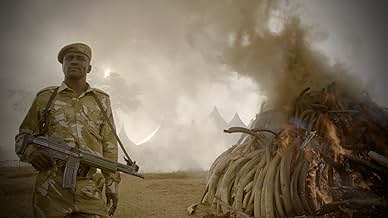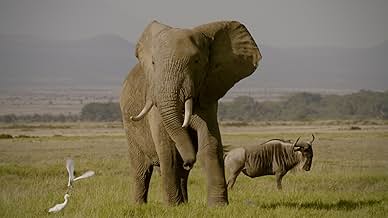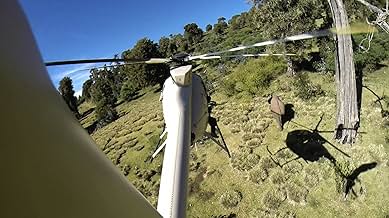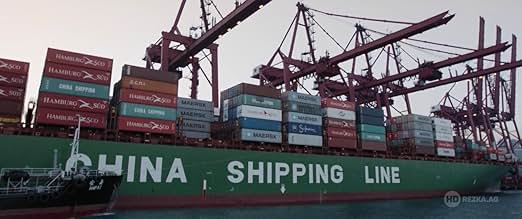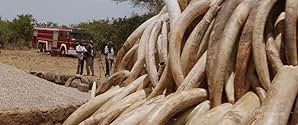VALUTAZIONE IMDb
7,8/10
3579
LA TUA VALUTAZIONE
Aggiungi una trama nella tua linguaWildlife activists in take on poachers in an effort to end illegal ivory trade in Africa.Wildlife activists in take on poachers in an effort to end illegal ivory trade in Africa.Wildlife activists in take on poachers in an effort to end illegal ivory trade in Africa.
- Premi
- 7 vittorie e 7 candidature totali
Recensioni in evidenza
First of all, this is a very well made documentary and you can notice that from the first shot. Directors Kief Davidson and Richard Ladkani have done a really great job in putting the pieces of ivory trade together in a very comprehensible narrative that exposes the whole circle of the game.
We get to know the whole infrastructure behind it, from local killers working for local dealers, to foreign dealers and (usually Chinese) wealthy buyers. The cinematography of it is breathtaking as we are taken to visit the natural habitat of Elephants in South East Africa and meet the people who try to protect them against all odds and overwhelmingly lack of resources. We get to know the enthusiastic wildlife conservationists working in Tanzania, Uganda, Zambia and get to know their motivation for fighting poachers and the whole illegal network. We get to know the man behind Wildleaks - an organization that leak the information about that network and we go undercover with them to meetings with dealers in China.
The whole documentary feels like a first class thriller with chase footage of the poachers and undercover agents risking their lives to expose the wide network, except this one is a reality.
Although one small minus for me was that not enough (in my opinion) was said about how complex,intelligent and emotional animals Elephants are. I mean they can paint, they visit spots where their members were killed or died and mourn the dead bones together, which we could consider as a form of ritual. They are able to use tools (although on lower level than chimps). Together with dolphins and apes they exhibit forms of self-recognition and they have an excellent memory.
Although elephants also cause some problems to people, especially in Asia where urbanization and human population claimed a lot of their natural habitats, the massive genocide of elephants for their ivory is a sign of something much larger than just ivory black market. It's a sign of expansion of human destructive relationship to our natural environment. We don't respect the nature as is documented by the global warming, and we don't give a sh*t about animals as they're mostly seen only as a necessary decoration of ever-shrinking wild nature.
I think this is a symbol of our addiction to power. We want to prove ourselves that we are the Gods and rulers of this planet and due to that addiction we are about to see some nasty results of that urge. Like there will be no elephants on the planet in few decades to come and more and more wild life territories will be sacrificed, so we will only know about the diversity of life from the history books. What kind of psychological effect will that have on future generation we can only speculate.
We get to know the whole infrastructure behind it, from local killers working for local dealers, to foreign dealers and (usually Chinese) wealthy buyers. The cinematography of it is breathtaking as we are taken to visit the natural habitat of Elephants in South East Africa and meet the people who try to protect them against all odds and overwhelmingly lack of resources. We get to know the enthusiastic wildlife conservationists working in Tanzania, Uganda, Zambia and get to know their motivation for fighting poachers and the whole illegal network. We get to know the man behind Wildleaks - an organization that leak the information about that network and we go undercover with them to meetings with dealers in China.
The whole documentary feels like a first class thriller with chase footage of the poachers and undercover agents risking their lives to expose the wide network, except this one is a reality.
Although one small minus for me was that not enough (in my opinion) was said about how complex,intelligent and emotional animals Elephants are. I mean they can paint, they visit spots where their members were killed or died and mourn the dead bones together, which we could consider as a form of ritual. They are able to use tools (although on lower level than chimps). Together with dolphins and apes they exhibit forms of self-recognition and they have an excellent memory.
Although elephants also cause some problems to people, especially in Asia where urbanization and human population claimed a lot of their natural habitats, the massive genocide of elephants for their ivory is a sign of something much larger than just ivory black market. It's a sign of expansion of human destructive relationship to our natural environment. We don't respect the nature as is documented by the global warming, and we don't give a sh*t about animals as they're mostly seen only as a necessary decoration of ever-shrinking wild nature.
I think this is a symbol of our addiction to power. We want to prove ourselves that we are the Gods and rulers of this planet and due to that addiction we are about to see some nasty results of that urge. Like there will be no elephants on the planet in few decades to come and more and more wild life territories will be sacrificed, so we will only know about the diversity of life from the history books. What kind of psychological effect will that have on future generation we can only speculate.
The documentary explores operations of poachers in Africa and further trafficking of illegal ivory to Asia where it is sold to local wholesalers who subsequently can deliver it to your doorstep a 'nominal' fee. The undercover footage gives the documentary great validity and evidential basis. Must be watched - thought-provoking and horrifyingly real.
Very good about an unspoken problem, we live in a world where people care more about how they look and what they can buy than actually solving real problems we create.
Documentary film seen on the 10th to the 11th of March 2021.
Documentary film seen on the 10th to the 11th of March 2021.
This proves that this type of film matters! Excellent story, well produced and beautifully filmed. China officially banned all forms of domestic ivory trade on December 31, 2017, sending a clear signal to global wildlife crime groups that peddling ivory in China would carry serious legal consequences and social costs. China's historic ban has significantly reduced ivory sales, but one consumer group-people who regularly travel outside China-have the highest intention of continuing to purchase elephant ivory post-ban. These magnificent animals need our protection! I like the new methods of using beehives to help farmers protect their crops. Sandi Jerome.
Great documentary about a problem that is not talked, we live in a world that people care more about how they look and what they can buy than actually solving real problems that we created... Its difficult to understand the point that we reached when theirs humans being killed to protect elephants and other animals from being extinct.
Lo sapevi?
- QuizThe twenty-ninth Netflix original documentary.
I più visti
Accedi per valutare e creare un elenco di titoli salvati per ottenere consigli personalizzati
- How long is The Ivory Game?Powered by Alexa
Dettagli
Botteghino
- Lordo in tutto il mondo
- 105 USD
- Tempo di esecuzione1 ora 52 minuti
- Colore
Contribuisci a questa pagina
Suggerisci una modifica o aggiungi i contenuti mancanti

Divario superiore
By what name was Caccia all'avorio (2016) officially released in Canada in English?
Rispondi

